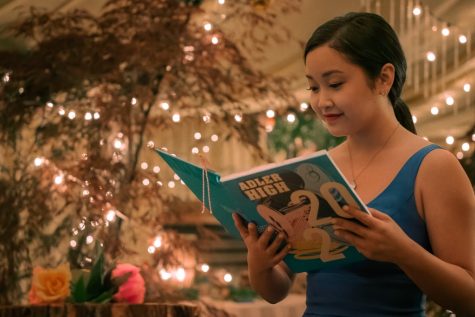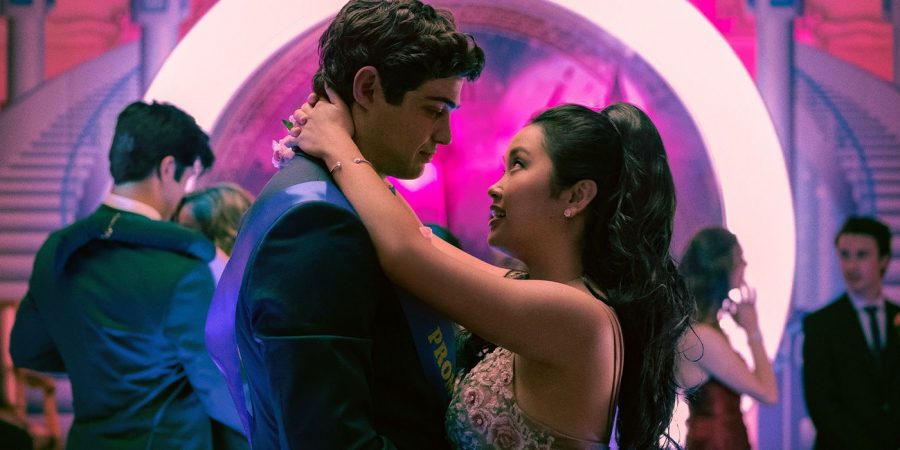To All the Viewers: This Series Isn’t Always and Forever
To all the rom-coms I’ve watched before: you set a low bar! To All the Boys: Always and Forever managed to exceed my expectations, just barely—which isn’t saying much. The third film of the To All the Boys series suffered a drastic drop in quality from the first and second—not because of the acting (Lana Condor and Noah Centineo were fantastic), but because of the lackluster script and dialogue. Written by Katie Lovejoy and directed by Michael Fimognari, the film took all the lovable aspects of the first and second movies and reduced them to a cheesy attempt at concluding Peter and Lara Jean’s love story.
TATB: AaF failed to capture the adorably comedic dynamic of Peter and Lara Jean in the first two movies. Condor and Centineo still had incredible chemistry and did their best with the dialogue they were given, but the truth is simply that their relationship got way too cheesy (see: when Lara Jean kissed Peter on his forehead and he gushed about how much he loved forehead kisses). The first two movies were a buildup to the pair finally having a solid relationship, but once they finally established one, it seemed as if the writers had no idea how to keep that charm. Almost every scene included some reminder of how much they loved or missed each other, and they barely had any personality traits aside from catering to one other. Peter’s reputation as a “cool jock” is not mentioned once in this movie, even though that was an incredibly important detail in the first two films. Any interaction the couple had at school was centered around their relationship, and Peter didn’t interact with any of his other friends aside from Trevor—but those conversations were focused on, you guessed it, Lara Jean. TATB: AaF spent nearly all its time solely on Lara Jean and Peter’s relationship, reducing the characters themselves to just one-half of a couple.
On that note, Lara Jean’s character development falls drastically when compared to the first two movies. In the first installment especially, viewers fell in love with Lara Jean: a creative and determined young woman who found herself in a situation she never thought she’d be in. Condor delivered comedic lines perfectly, making the moments that could’ve been cliche seem funny and fresh instead. Though Condor’s skillful acting remained consistent throughout the series, in TATB: AaF, there was only so much she could do with the lack of character development Lara Jean was given.
In particular, Lara Jean, who is half-Korean, talks about her disconnect with Korean identity at the very beginning of the film—but it’s completely dropped for the rest of the plot. Her journey to relate with Korean culture is an extremely important component of the series, as the films are based on a book trilogy by Jenny Han (who is Korean-American herself). The incorporation of Lara Jean’s culture would have been representative of the vision Han had for her series when she first wrote it. It also would have provided a way for Lara Jean to feel more connected to her Korean mother, who had passed away when she was young. But instead, Lara Jean, a character that was once an independent young woman at the beginning of the series, regresses into someone who bases her major life decisions on her high school boyfriend. The majority of Lara Jean’s internal struggle to choose a college is focused on how Peter will feel, turning what should have been a new, exciting chapter of her life into a problem that was holding her back. Though Lara Jean does end up following her dreams, it takes almost an entire hour and a half for her to find the independence she originally had—and even then, it’s impossible for her character’s complexity to reach the level it was at previously.

Now, while I had quite a few problems with this movie, I can’t argue against the fact that some parts made me feel warm and cozy—which is exactly how you should feel while watching a rom-com. The relationship between Lara Jean’s dad and his new significant other Trina was absolutely adorable, and Trina’s relationship with the girls never failed to bring a smile to my face. Their wedding was absolutely gorgeous, and the happiness LJ and her sisters felt for their dad was simply heartwarming. Additionally, the film’s transitions—such as the cartoon-like backgrounds that faded into real-life sets and planes flying over countries on a cartoon map—were creative. But maybe most importantly, the sub-plot of Peter reconnecting with his dad towards the end of the film made him seem like more than just half of a couple, and actually added some development for his character arc to end on.
To All the Boys: Always and Forever didn’t manage to conclude the series with the same amount of charm and romance as the previous films, but it had a few saving graces in sub-plots and side characters. And as a whole, this series will always and forever be in our hearts.


